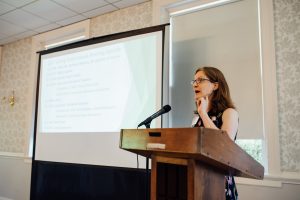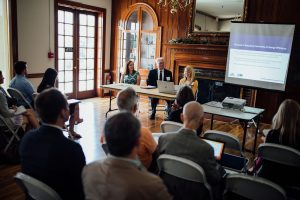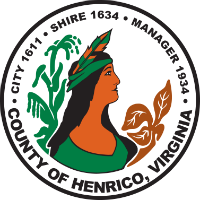Recap of VAEEC Spring 2017 Meeting
By Kelley Flint
On May 19th, the VAEEC held their semi-annual member meeting, where speakers and attendees discuss this year’s pertinent theme—Opportunities in the Midst of Change. Over 100+ advocates from diverse backgrounds were in attendance, representing businesses, utilities, nonprofits, national associations, local governments and state agencies. While our current political climate is uncertain, VAEEC’s members and additional advocates made it clear they’re committed to continuing the push for energy efficiency and solutions that move Virginia forward.

The registration table featured the latest VAEEC report.
As an intern for VAEEC and first-time attendee, it was empowering to hear the discussions that took place from people with expertise and experience in this growing field. The presentations, questions posed and answers given were reassurance that even amidst all the unknowns in the environmental and energy sectors, there are people dedicated to making a tangible impact in my home state.
Here’s a brief recap of what was on the agenda.
-Executive Director Chelsea Harnish kicked things off with an introduction to the meeting’s topics and summary of the goals for VAEEC’s future. In addition to discussing the direction of the organization, she laid out five policy recommendations that are part of a newly-released report, “Why Energy Efficiency is a Smart Investment for Virginia”.

Executive Director Chelsea Harnish kicked off the spring meeting.
-Members then took turns sharing their success stories before splitting into groups for our first breakout sessions.
-In one room, Rich Dooley of Arlington County and Paul Brooks of Johnson Controls discussed Property Assessed Clean Energy (PACE) funding. The session focused on the development of PACE in Arlington, and how a local model can be used to fund energy efficient commercial buildings without taxpayer money. Paul Brooks also presented examples of PACE success in renovation projects and how PACE provides a financing solution to funding energy efficiency. The commercial PACE session was moderated by Abby Johnson from Atlantic PACE and Abacus Property Solutions.
-Meanwhile, the residential session took place next door and discussed the importance of Consistent Messaging. The speakers, Andy Farmer of Virginia Energy Sense and Casey Hollins of Rappahannock Electric Cooperative, emphasized outreach in communities and the variety of programs that can jump-start energy efficiency in the public. The residential consistent-messaging session was moderated by Jessica Greene from the Virginia Energy Efficiency Council.
-After lunch, the second round of breakout sessions included a presentation on New Commercial Technologies, led by Kristy Shoemaker of Trane and Greg Merritt of Cree Lighting. The presentation highlighted how rapidly evolving technology has created connections between devices, buildings and people that can be utilized to create more efficient energy use. Lighting technology was highlighted by Greg Merritt as an important advancement that reduces energy consumption by creating awareness of usage as well as reducing energy usage itself through technology changes. The commercial session on new technologies was moderated by John Morrill from Arlington County.

Panelists in the Sunroom discussed ways to address residential energy efficiency.
-At the same time as the commercial panel, Lauren Westmoreland of Southeast Energy Efficiency Alliance spoke about Building Codes. The session discussed how outdated codes prevent buildings from meeting efficient standards. Virginia is also in the middle of creating it’s 2015 building codes, and the juncture could be an opportunity to propel energy efficiency in Virginia. The residential session on building codes was moderated by Andrew Grigsby from the Local Energy Alliance Program.
-The final panel was led by Dan Bresette with the Alliance to Save Energy and Richard Caperton with Oracle. The panel discussed the Federal Implications for Energy Efficiency in Virginia and included an audience Q&A. The panel’s message highlighted that regardless of the direction the federal government takes, and the challenges budget cuts and policy changes may pose, Virginia has the opportunity to move forward with energy efficient solutions and pave the way for other states to follow. The final panel on federal implications in Virginia was moderated by Tom Nicholas from the City of Virginia Beach.
The full agenda can be found on the VAEEC website under Events. If you attended the event, please fill out this brief survey.
A special thanks to all of our event sponsors for making the Spring Meeting possible!
Venue Sponsor

Partners of VAEEC

Friends of VAEEC




